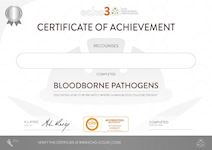
Bloodborne Pathogens online training - Echo3
CPD Accredited online training course taking about 60 mins with emailed certificate included
ECHO3 EDUCATION LIMITED
Summary
- Certificate of completion - Free
- Exam(s) / assessment(s) is included in price
- Tutor is available to students
Add to basket or enquire
Overview
Bloodborne Pathogens Awareness Training objectives
Bloodborne pathogens, or BBPs, are micro-organisms that cause disease. They are transmitted through contact with contaminated blood or body fluids.
The three BBPs that pose the greatest risk in your workplace are the hepatitis B virus, the hepatitis C virus, and the human immunodeficiency virus, or HIV.
Take the Bloodborne Pathogens training to learn the risks of BBPs and how you can protect yourself and colleagues.
Certificates
Certificate of completion
Digital certificate - Included
Valid for 3 years. Certificate on completion
CPD
Course media
Description
Duration: 40 minutes
Online Bloodborne Pathogens Training course
Certificate available for instant download on completion
Bloodborne Pathogens Learning objectives
- know what bloodborne pathogens are;
- recognize symptoms and treatments for hepatitis B, hepatitis C and the human immunodeficiency virus;
- identify how bloodborne pathogens are transmitted;
- remember to assume that all blood and other potentially infectious materials, or OPIM, are contaminated and handle them accordingly;
- recall safe handling procedures for blood and OPIM; and
- recall emergency procedures for blood or OPIM exposure.
Who is this course for?
This Bloodborne Pathogens course is for anyone working the Health Care should be aware of the risks associated with BBPs.
Requirements
There are no requirements prior to taking this Bloodborne Pathogens course.
Career path
Anyone wishing to work in tattoo parlour, healthcare or beauty will be helped in their application by completing this Bloodborne Pathogens course
Questions and answers
Currently there are no Q&As for this course. Be the first to ask a question.
Reviews
Currently there are no reviews for this course. Be the first to leave a review.
Legal information
This course is advertised on reed.co.uk by the Course Provider, whose terms and conditions apply. Purchases are made directly from the Course Provider, and as such, content and materials are supplied by the Course Provider directly. Reed is acting as agent and not reseller in relation to this course. Reed's only responsibility is to facilitate your payment for the course. It is your responsibility to review and agree to the Course Provider's terms and conditions and satisfy yourself as to the suitability of the course you intend to purchase. Reed will not have any responsibility for the content of the course and/or associated materials.





